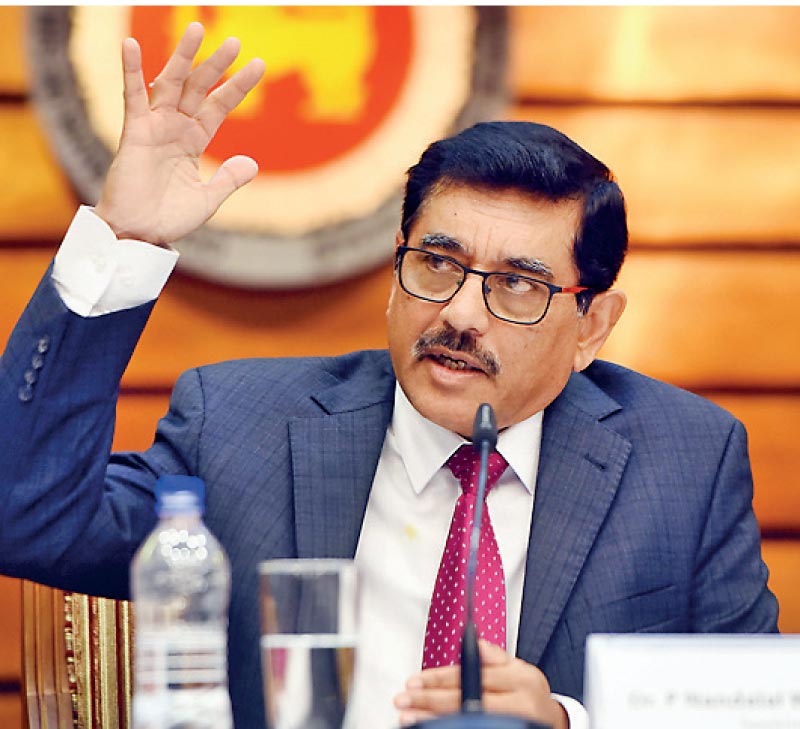Monday Feb 16, 2026
Monday Feb 16, 2026
Friday, 25 August 2023 03:17 - - {{hitsCtrl.values.hits}}

Central Bank Governor Dr. Nandalal Weerasinghe
By Charumini de Silva
Central Bank Governor Dr. Nandalal Weerasinghe yesterday expressed confidence in fulfilling the commitments and implementing all reform targets before the next Executive Board Meeting of the International Monetary Fund (IMF) in November.
Speaking at the post-monetary policy review meeting media briefing, he praised the Government’s commendable progress towards quantitative targets.
“Except for revenue targets, all other targets have been met so far,” he added. He emphasised the collective efforts of the Government, Central Bank, and other authorities in achieving these milestones.
In preparation for the upcoming IMF Mission, scheduled for the following month, Dr. Weerasinghe clarified that this visit is not a strict deadline, but rather a preliminary assessment before the next board meeting review.
He assured that Sri Lanka is committed to completing all necessary reforms before the first review of the Extended Fund Facility.
Weerasinghe also acknowledged the possibility of implementation delays while underlining that these delays don’t signify a reversal of progress. “Instead, they might indicate a slower pace of advancement, without changing the overall trajectory,” he said. He also explained that the debt restructuring plan aims to reduce financial pressure by lowering annual debt payments from $ 6 billion to $ 3 billion.
“Negotiations are expected to focus on securing an extended grace period or a reduction in debt obligations,” he said.
Regarding debt servicing, Dr. Weerasinghe disclosed the Government’s objective to reduce the current annual debt payment of 9.4% of GDP to 4.5%, by slashing it down almost half.
Post-debt restructuring, he said the focus shifts to enhancing reserves, to increase reserves from current $ 3 billion to over $ 10 billion and reducing annual debt servicing costs over 10 years from 2027-2037.
He also highlighted the importance of reaching agreements with all external creditors on terms and conditions parallel to the Domestic Debt Optimisation (DDO).
Dr. Weerasinghe clarified that the economy will not reverse back to the previous debt repayment cycles as claimed by individuals.
He said plans to restart foreign-funded development projects and leverage existing forex earning channels like workers’ remittances, tourism, and export efforts, combined with the debt restructuring plan are expected to contribute to the gradual restoration of economic stability in Sri Lanka.
The Central Bank Governor expressed confidence that the DDO process would be completed despite certain legal disputes challenging the timeline.
Reflecting on recent legislative developments, he cited the example of the Central Bank Act, which experienced a timeline shift from April to June for approval by Parliament. “However, this variation did not detract from the overarching commitment to reforms,” he pointed out.
The Governor refrained from commenting on IMF target projections made by local think tanks, highlighting their lack of accurate information.
He emphasised that economic activities are projected to recover gradually during the second half of 2023 and reach potential level thereafter. “Reforms and policies will certainly matter in reaching potential medium to long-term growth,” he added.
The Central Bank’s Annual Report, released in April, anticipated a 2% contraction in the economy for 2023, primarily due to the challenges posed by the worst financial crises the country faced post-independence.
The growth in the second half will be supported by the normalisation of monetary conditions, improvements in business confidence, enhancements in supply conditions and the relaxation of import restrictions, and the impact of growth-promoting structural reforms.
Dr. Weerasinghe stressed that revisions to the outlook would only be considered in the presence of significant deviations from the initial forecast.
The Central Bank’s projection for 2024 indicates a growth rate of 3.3%, reflecting the institution’s optimism about the potential economic rebound.
Commenting on private sector credit growth, he noted a lack of substantial demand for credit amidst expectations of further interest rate reductions. He observed that the appetite for credit seems concentrated on essential and reprising loans, indicating a shift in borrowing trends.
The Governor said that recent changes in demand for private-sector credit have not exerted significant pressure on the rupee.
He also acknowledged the Central Bank’s vigilance against sudden import surges. “Despite the relaxed import regulations, the bank has not observed any significant increase and the import bill is stable at the $ 1.3 billion level,” he added.
